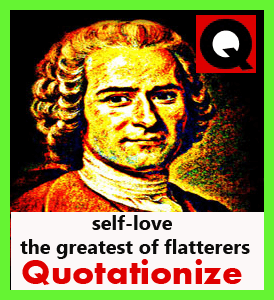“Self-love is the greatest of flatterers” is a short and simple maxim by the French writer Francois De La Rouchefoucauld.
But it is never short of profound insights.
Now, let’s break it down and check it out the meaning of this maxim.
In his time, Francois La Rochefoucauld used the term “self-love” is definitely referring to self-admiration, self-adulation or being narcissistic.
Nowadays self-love has adopted a more positive conotations.
It is now defined it as self-worth, or love of self and regard for one’s own happiness or advantage.
We will talk more about this new take on self-love later on in this post.
Self-love The Greatest Flatterers
For now, let’s continue…
The line simply means: the act of self-love is merely flattering your own self.
La Rochefoucauld used the analogy: self-love as a flatterer.
As you know a flatter or a sycophant is a person who lavishes insincere praises or compliments.
In short, self-love is self-deluding.
The key point here is the phrase “the greatest of flatterers“.
The noted French author of maxims and memoirs used the superlative “the greatest“, to mean the most influential or powerful.
We all have other dark traits that influence our life (greed, pride, envy, suspicion, etc.) but the negative self-love is most persuasive one.
We are easily taken in or being deceived by our own self-love.
As they say, you are your worst enemy.
It means most of your problems or most of the bad things that happen to you yourself, because of your character.
By the way, the easiest person to fool is usually yourself.
Remember this quote by Nobel-winning physics Richard P. Feynman:
“The first principle is that you must not fool yourself — and you are the easiest person to fool.”
(California Institute of Technology, Graduation Commencement Address, June 4, 1974)
(The quote is also found in: )
Self-love And Jean-Jacques Rousseau
According to the Genevan philosopher, writer and composer Jean-Jacques Rousseau, there are two types of self-love.
The first one is amour de soi (self-respect).
It is the natural interest we have for our own survival and well-being.
The one that directs us first to attend to our most basic biological needs for things like food, shelter and warmth.
The second one is amour-propre (pride).
He claimed that this amour-propre is an unhealthy or destructive self- love by comparing ourselves with other people.
This self-interested drive concerned with comparative success or failure as a social being.
We have this feeling when we begin to form social relationships with one another, and we begin to take notice of what others think of us.
Rousseau thought that this kind of self-love or recognition is subject to corruption, that can drive us to vice and misery.
We humans are driven by a desire for recognition and approval, regardless of whether or not that recognition is due to something that is truly worthy of respect.
At its extreme, people could even put others down, so that they might feel superior themselves.
()
All this time, when we say self-love it means people who appear too full of themselves.
In 1956 psychologist and social philosopher Erich Fromm proposed that loving oneself is different from being arrogant, conceited or egocentric.
You can read all about it in his 1965 book “The Art of Loving“, in the chapter “Self Love”.
(Here is another source of the book.)
To him, self-love is more about caring oneself and taking responsibility for oneself.
It means taking care of your own needs and not sacrificing your well-being to please others.
Positive Sides Of Narcissists
Interestingly, the latest studies says that although narcissists can be challenging to work with, they can easily attract a following of people, are more likely to receive promotions and often get paid more.
In addition, these people also tend to be mentally tougher and have lower rates of depression and stress than their humbler peers.
These narcissistic folks are driven by the belief that they deserve the best in life.
*Here is a great selection of insightful maxims by Francois De La Rochefoucauld.
